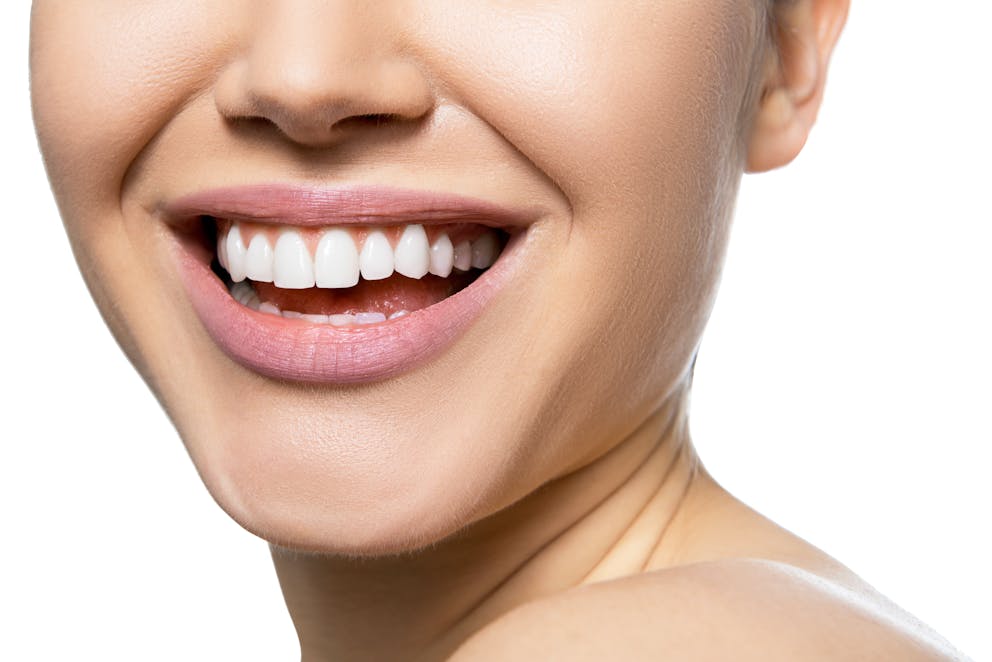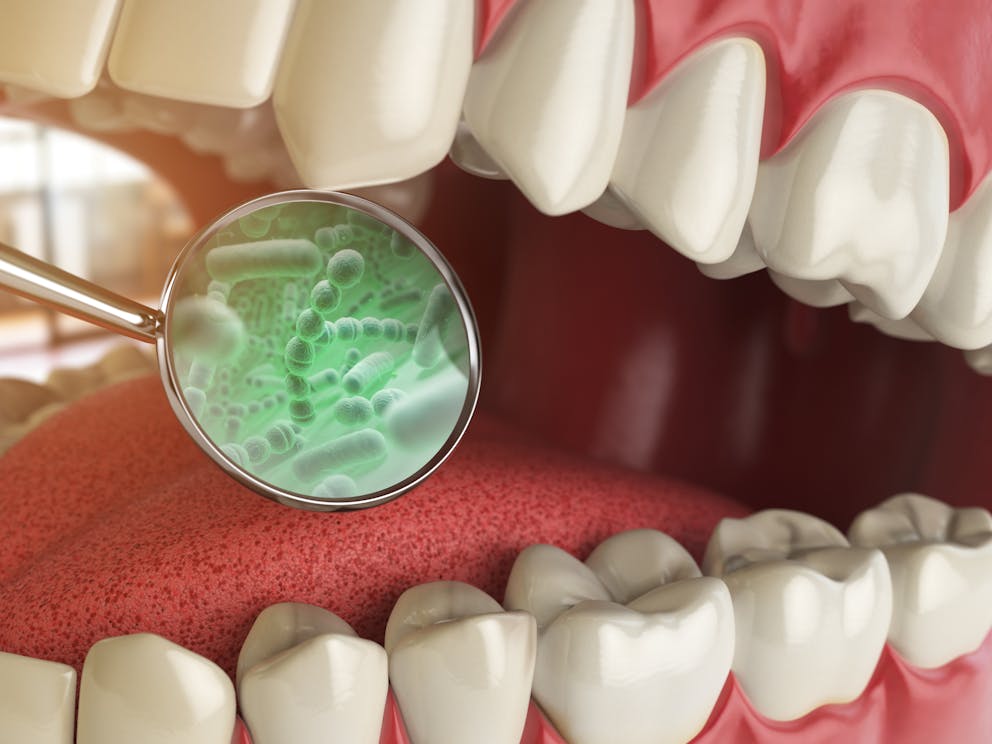4 Benefits of Oral Probiotics – And How To Use Them
Oral probiotics are good bacteria that are present in the oral cavity. These beneficial microbes maintain a healthy mouth and can help prevent oral infections, periodontal disease, and gum bleeding.
Let’s look at four benefits of oral probiotics and find out if you may benefit from taking an oral probiotic supplement.

What are oral probiotics?
While it’s well known that probiotics promote digestive health and immune system function, many people remain unaware of the importance of probiotics for oral health.
Oral probiotics, also called dental probiotics, are beneficial microbes that naturally reside in the oral cavity. These healthy bacteria and fungi form the oral microbiome, which plays a crucial role in keeping your mouth healthy.
A diverse oral microbiome competes with pathogenic microbes for nutrients and space, which helps prevent the overgrowth of bad bacteria, viruses, and yeasts linked to various oral health problems.
Research published in Nutrients suggests that sugar consumption, smoking, poor oral hygiene, antibiotic drugs, and regular use of antibacterial mouthwash can disrupt the balance of oral microorganisms, a condition known as oral dysbiosis.
Oral dysbiosis increases the risk of several oral and dental health problems, including:
Dental caries
Tooth decay
Bad breath
Oral inflammation
Gum disease
Oral cancer
Oral probiotic supplements offer a convenient and highly effective way to restore an imbalanced oral microbiome, lower the risk of various oral diseases, and help improve overall oral health.
Watch the video below to learn how to maximize the health benefits of probiotic supplements.
Four benefits of oral probiotics
Not only do certain probiotic strains have oral health benefits, but promoting a diverse oral microbiome can also promote a healthy digestive system and may lower the risk of cardiovascular disease.
A study published in Microbiology investigated the relationship between oral probiotics and health and concluded, “The mouth is the gateway to total body wellness, and the oral microbiome influences the oral and overall health of an individual.”
Here are four health benefits of oral probiotics.
1. Cavity prevention
Dental caries is one of the most common dental problems and the leading cause of cavities and tooth decay.
Probiotic bacteria can prevent the growth and proliferation of pathogenic bacteria such as Streptococcus mutans and certain lactic acid bacteria that produce acids linked to tooth enamel erosion.
In addition, a balanced oral microbiome helps stimulate saliva production, which plays a crucial role in neutralizing acids, remineralizing enamel, and flushing away debris.
2. Support gum health
Dental probiotics promote a balanced oral microbiome, which is linked to a lower risk of bleeding gums and gum disease.
“Beneficial oral microbes have anti-inflammatory properties and support the integrity of the gum tissues,” explains Dr. Berg. “This helps prevent gum inflammation and protects from microbial infections linked to the development of periodontitis.”
Research published in Frontiers in Physiology suggests that individuals with periodontitis are at significantly higher risk of cardiovascular disease and heart failure.
Oral probiotics promote gum health and may lower the risk of potentially harmful oral bacteria entering the bloodstream, where they can trigger inflammation and vascular damage linked to atherosclerosis and poor cardiovascular health.
3. Bad breath remedy
Oral probiotics are an effective natural remedy to combat bad breath by preventing the growth of microbes linked to the release of volatile sulfur compounds (VSCs).
VSCs are a leading cause of foul-smelling breath, and taking oral probiotic bacteria to improve bad breath has been found to be more effective than using antimicrobial mouthwash.
4. May prevent oral cancer
Research published in The Archives of Oral Biology found that oral probiotics may play a role in reducing cancer risk.
The study suggests that certain strains of Lactobacillus have demonstrated anti-cancer properties that may potentially reduce the risk of various types of oral cancer.

Best probiotic strains for oral health
According to research published in Applied and Environmental Microbiology, the two primary types of oral probiotics are Streptococcus and Lactobacillus.
Each strain has unique benefits for oral health, and they work in synergy to maintain a balanced oral microbiome.
Here are some of the best probiotic strains for oral health:
Streptococcus salivarius K12
Streptococcus salivarius M18
Lactobacillus reuteri
Lactobacillus salivarius
Lactobacillus paracasei
Lactobacillus sakei

How to use oral probiotics
Oral probiotics are available in various forms, including lozenges, mouth rinses, chewable tablets, and liquid probiotic supplements.
The ideal time for oral probiotics is right after completing your nightly oral hygiene routine. This allows sufficient contact time between beneficial bacteria and gum tissue and ensures maximum effectiveness.
However, it’s crucial to carefully check the instructions of the probiotic product you plan to use and avoid taking oral probiotics with hot drinks, as heat destroys most microorganisms.
It’s equally important to consider the best form of oral probiotics for your needs.
While probiotic lozenges and mouthwashes can help promote a healthy oral microbiome, they typically don’t deliver significant concentrations of beneficial bacteria into the gut.
Liquid probiotic supplements, on the other hand, can increase microbial diversity in the oral cavity and support a diverse intestinal microflora at the same time.
Best natural sources of probiotics for oral health
In addition to taking probiotic supplements to improve oral health, there are plenty of probiotic-rich foods you can incorporate into your diet to support a healthy oral microbiome.
Here are some of the best probiotic foods for oral health:
Kimchi
Tempeh
Natto
Miso
Yogurt
Evidence published in Frontiers in Microbiology confirms that regular consumption of probiotic food sources such as fermented products is associated with better oral health, decreased gum bleeding, reduced tooth decay, and a lower risk of oral disease.

How long does it take for oral probiotics to work?
How long it takes for dental probiotics to work depends on the composition of your oral microbiome, your dental hygiene routine, and the severity of the oral health issues you are addressing.
Minor oral issues such as bad breath or mild gum bleeding typically resolve within two weeks of using oral probiotics.
However, individuals with more severe cases of poor oral health may require several months of consistent oral probiotic use to notice improvements.
Risks of oral probiotics
Oral probiotic supplements are generally well tolerated and considered safe.
However, individuals with compromised immune systems and those undergoing chemotherapy treatment or taking immunosuppressant drugs shouldn't take probiotics due to an increased risk of microbial infection.
In addition, some people are allergic to components of probiotic supplements, and it’s crucial to seek immediate medical attention if you develop symptoms such as swelling, wheezing, or shortness of breath after taking oral probiotics.

Key takeaways
There are several benefits of oral probiotics, including improved gum health and a lower risk of periodontitis, cavities, and oral cancer. Probiotics can also help get rid of bad breath and reduce plaque buildup.
Liquid oral probiotic supplements offer an effective and convenient way to support a healthy oral microbiome and can deliver beneficial microbes into the gut, which promotes a diverse intestinal microflora.
Additional Probiotics Resources
Keto-friendly probiotics
FAQ
1. Is it good to take probiotic supplements every day?
Taking probiotic supplements every day is generally considered safe and an effective strategy to support microbial diversity and promote a healthy microbiome.
2. What are the benefits of oral probiotics?
Oral probiotics are beneficial bacteria that help prevent the growth of potentially harmful bacteria and yeasts linked to gum disease, oral inflammation, cavities, and bad breath.
In addition, certain strains of Lactobacillus have been found to lower the risk of oral cancer.
3. What are the disadvantages of oral probiotics?
While there are generally no disadvantages of oral probiotics, it’s crucial to remember that oral probiotic supplements in the form of mouth rinses or lozenges may not deliver beneficial bacteria into the gut and only confer health benefits within the oral cavity.
4. What are the best probiotic strains for oral health?
Bacterial strains, including Streptococcus salivarius K12, Streptococcus salivarius M18, Lactobacillus reuteri, Lactobacillus salivarius, and Lactobacillus paracasei are among the best oral health probiotics.
5. How long does it take to get rid of bad breath with probiotics?
Mild cases of bad breath typically improve within a couple of weeks of taking oral probiotics.
However, getting rid of bad mouth odor caused by severe microbial overgrowth may require several weeks of consistent oral probiotic supplementation.
6. Can oral probiotics help with bad breath?
Yes, oral probiotics can be an effective remedy for bad breath.
Increasing microbial diversity in the oral cavity can help eliminate odor-producing bacteria linked to tooth decay, gingivitis, and bad breath.
7. Do oral probiotics reach the gut?
While oral probiotics in the form of lozenges or mouth rinses are unlikely to reach the gut, liquid probiotic supplements can promote a diverse oral microbiome and increase beneficial microbes in the gut.
8. Can probiotics help prevent cavities?
Yes, oral probiotics work to improve oral health and have been found to prevent cavities.
Oral probiotics promote a healthy oral microbiome, which helps prevent the overgrowth of bacterial strains, such as Streptococcus mutans and certain lactic acid bacteria, which are linked to tooth enamel erosion and cavities.
Sources
https://www.frontiersin.org/articles/10.3389/fphys.2022.854606/full
https://www.sciencedirect.com/science/article/abs/pii/S0003996920302338
https://www.frontiersin.org/articles/10.3389/fmicb.2022.845166/
Previous blog
How to Use Probiotics for Sugar CravingsTags

Popular
08/21/2024
55K views
02/23/2025
46.3K views
11/18/2024
277.5K views
03/18/2024
11/21/2022




